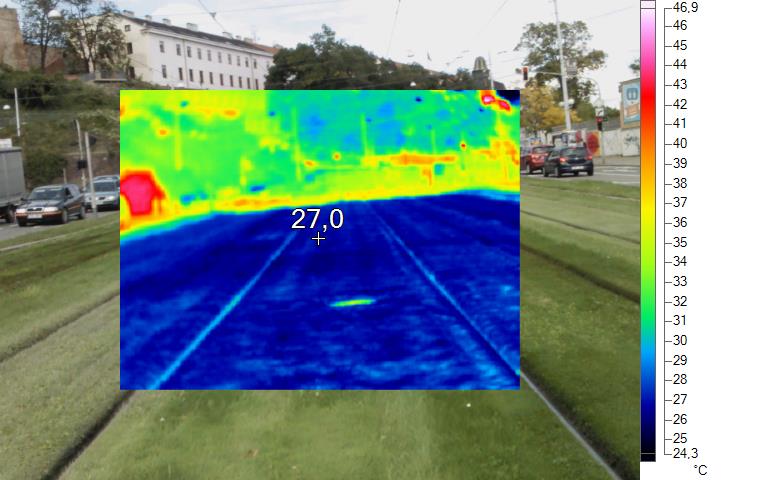Thessaloniki gets ready for its metro launch in November
The underground rapid transit lines have been under construction for almost two decades due to various project delays
 TheMayor.EU logo
TheMayor.EU logo During the summer, surface temperatures in cities can reach up to 70° C, absorbing heat and feeding it back into the environment for hours, never truly cooling down
As another summer rolls around in the EU, many people who live in cities far away from the cool breeze of the sea or ocean are bracing for yet another season of record-breaking temperatures. As thermometers climb and rain becomes scarcer climate change is on the mind of many.
In fact, according to the European Drought Observatory, in Southern France, a large portion of East Germany and Western Poland, as well as the Alps region are currently experiencing drought-like conditions.
This is why the Czech Environmental Partnership Foundation (Nadace Partnerství) published a set of measures that cities can implement to cool the urban environment. Their recommendations include ways to retain water and increase green spaces.
According to Martin Ander, a spokesperson for the foundation, we are not helpless in the face of extreme heat. Actually, cities can do quite a lot to disrupt heat islands and regulate temperatures.
Most importantly, the Partnership Foundation focuses on raising awareness about the importance of cooling certain surfaces like concrete and asphalt, especially on building facades and roads, as those are usually left to bake in the sun.
The key point of their recommendations centres around creating a positive feedback loop between urban greenery and water. As large population centres, by design, have a lot of concrete and asphalt - surfaces that absorb heat and release it well into the night, finding a cool space in a city is nearly impossible. According to a statement by the foundation, surface temperatures in cities can reach up to 70° C.
Not only that but, they also say that smaller rural towns can experience even greater heat. This applies especially to towns surrounded by tree-less agricultural land.
Furthermore, they provided a heat chart, comparing the temperatures on a green tram track to the adjacent asphalt road. The chart shows that the green track’s temperature sits at around 27° C, while the road is at around 40° C.

Vegetation is key in both rural and urban areas, particularly trees, as they retain rainwater for longer and they evaporate more of it on hotter days, cooling their surroundings. The foundation claims that an adult birch evaporates around 70 litres of water on an average day, however, that number can go up to 400 litres as temperatures rise.
They also recommend replacing asphalt and concrete whenever possible with grass paving or gravel lawns. Additionally, implementing designs to retain rainwater like seepage belts, rain beds, manholes or collecting ponds would also help feed the tree population.
Martin Ander was quoted in a press release, saying: “We can build or modify our housing so that it does not overheat on hot days. We paint the facade and roof with a light colour that reflects more sunlight back into the surroundings. Let's plant greenery around the house, use climbing plants or even a green roof. It is also important to shade from the outside using outdoor blinds, shutters, pergolas or awnings, or ventilate in the early morning and evening.”

The underground rapid transit lines have been under construction for almost two decades due to various project delays

Now you can get your wine in Talence by paying directly in Bitcoin

That’s because the state has to spend money on updating the railway infrastructure rather than subsidizing the cost of the popular pass

Rethinking renewable energy sources for the urban landscape

The examples, compiled by Beyond Fossil Fuels, can inform and inspire communities and entrepreneurs that still feel trepidation at the prospect of energy transition

Now you can get your wine in Talence by paying directly in Bitcoin

The 10th European Conference on Sustainable Cities and Towns (ESCT) sets the stage for stronger cooperation between the EU, national and local level to fast track Europe's transition to climate neutrality.

At least, that’s the promise made by the mayor of Paris, Anne Hidalgo

The underground rapid transit lines have been under construction for almost two decades due to various project delays

At least, that’s the promise made by the mayor of Paris, Anne Hidalgo

Hostal de Pinós is located in the geographical centre of the autonomous region

Despite its church-y name, the district has long been known as the hangout spot for the artsy crowds

Urban dwellers across the EU are having a say in making their surroundings friendlier to people and the environment.

Forests in the EU can help green the European construction industry and bolster a continent-wide push for architectural improvements.

Apply by 10 November and do your part for the transformation of European public spaces

An interview with the Mayor of a Polish city that seeks to reinvent itself

An interview with the newly elected ICLEI President and Mayor of Malmö

A conversation with the Mayor of Lisbon about the spirit and dimensions of innovation present in the Portuguese capital














